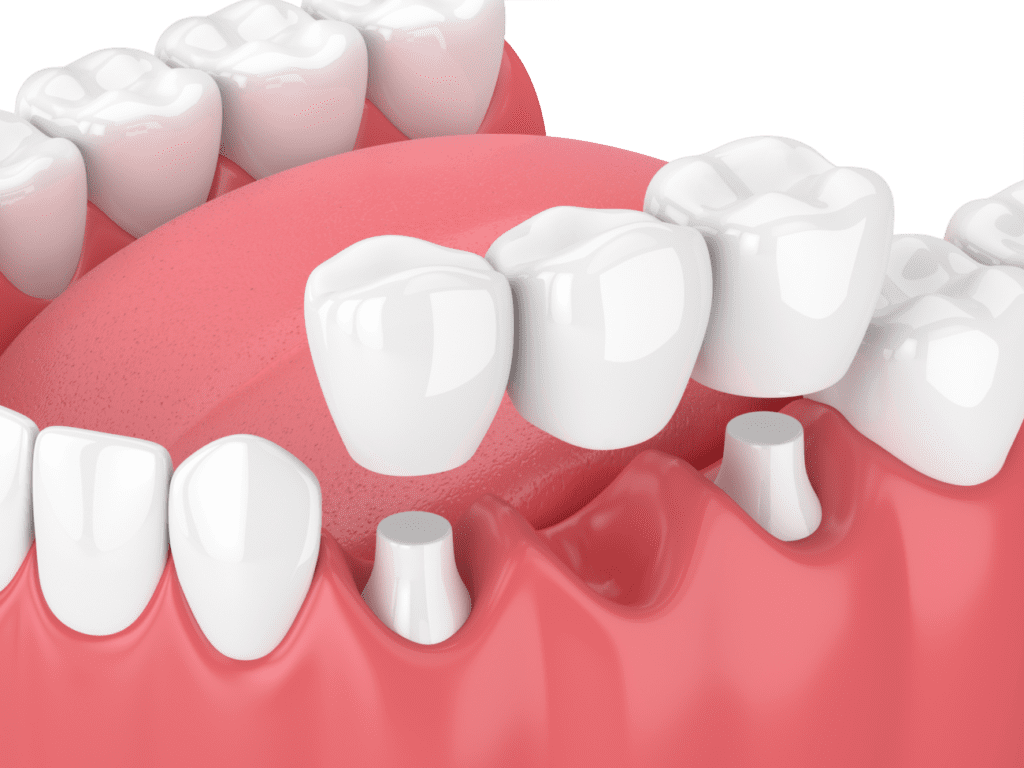A dental bridge is an essential dental tool in modern dentistry that replaces missing teeth. Dental bridges are effective prosthetics if you are missing one tooth or several teeth in a row. A dental bridge treatment will restore your oral health and the aesthetics of your mouth.
Our dentists will create a custom treatment plan to replace your missing teeth using a dental bridge in Hunt Valley. Our office also offers general dental services in Baltimore County, MD.

What is a Dental Bridge?
A bridge is a prosthetic dental appliance that will fill in the gaps created by one or more missing teeth. A bridge consists of a framework with the artificial teeth (pontics) attached to it. The dental bridge will remain in place using natural teeth or dental implants.
The natural teeth or dental implants will act as the anchors for the dental bridge. This essential dental restoration will restore your ability to chew food, and keep your remaining teeth from shifting.
Who Needs a Dental Bridge?
Anyone missing a single tooth or several teeth in a row can benefit from getting a dental bridge. No matter how or why you lost your teeth. Whether it’s from decay, trauma, gum disease, or congenital issues, your dentist may recommend a bridge. A dental bridge will:
- Help you chew your food more efficiently
- Speak properly
- Keep your teeth in proper alignment
- Prevent TMJ disorders
- Improve the appearance of your teeth by filling in the gaps
Types of Dental Bridges
Several types of dental bridges are available to accommodate our patient’s different needs. We can design them to replace a varying number of missing teeth. The common types of dental bridges are:
- Traditional Fixed Bridge: This is the most common type that dentists use. A traditional fixed bridge typically replaces one tooth however it can replace several teeth. It consists of a pontic that will replace the tooth, and dental crowns will hold it in place. The dentist will place the crowns on the adjacent remaining teeth.
- Implant-Supported Bridge: Dental implants can also anchor the bridge in place. This is a suitable solution for patients missing multiple missing teeth in a row. The permanent bridge consists of several pontics that will fill in the gaps and support the dental crowns. The crown portion of the bridge attaches to the dental implants instead of healthy, remaining teeth.
- Cantilever Dental Bridge: Sometimes our patients will only have one healthy tooth available to secure the bridge. In these cases, the dentist will recommend a cantilever bridge. A cantilever bridge only uses one dental crown that the dentist cements to an abutment tooth.
- Resin-Bonded Bridge: This type of bridge primarily replaces front teeth. The process involves bonding a pontic to the adjacent teeth with metal or porcelain wings. A resin-bonded bridge is a less invasive treatment option but may not be as durable as other types.
How to Avoid Dental Bridge Failure
Protecting your dental bridge will ensure its longevity. If patients adhere to the following guidelines, they can help avoid bridge failure.
- Maintain proper oral hygiene: A strict oral hygiene routine will help prevent tooth decay and gum disease. You will need to brush your teeth every day and floss regularly. This is includes flossing under the bridge and properly cleaning your bridge and anchor teeth.
- Consume a healthy diet: Eating a healthy diet that promotes overall and oral health is important. We advise that you limit sugary and acidic foods, as they can damage both natural teeth and the bridge.
- Avoid damaging and bad habits: There are certain habits that may damage your dental restoration. This includes biting your nails, chewing on hard things like ice or popcorn kernels, and using your teeth as tools.
- Visit your dentist regularly: Visit your dentist regularly for check-ups and professional cleanings. This helps detect and address any issues with the bridge at an early stage.
- Protect your teeth during sports: If you play contact sports or activities that could result in a dental injury, you should wear a mouthguard. This will protect the bridge and your remaining teeth.
Frequently Asked Questions
We have answers to some commonly asked questions about dental bridges.
Can a dental bridge prevent further tooth loss?
Yes, a dental bridge can help stabilize your mouth by preventing neighboring teeth from shifting. This stability reduces the risk of additional tooth loss or damage, especially when the bridge is properly maintained and supported by healthy surrounding teeth.
How long does it take for a dental bridge to settle?
A dental bridge typically takes a few days to a few weeks to settle fully. During this time, your mouth adjusts to the bridge, and any minor sensitivity or discomfort usually fades. If it feels uncomfortable after a few weeks, follow up with your dentist to ensure the fit is correct.
What happens if I get a cavity under a bridge?
A cavity under a bridge can compromise the supporting teeth and the bridge’s stability. Your dentist may need to remove the bridge to treat the decay. In severe cases, the bridge may need to be replaced entirely after the underlying teeth are repaired.
Does food get stuck under a dental bridge?
Food can sometimes get trapped under a bridge, especially near the artificial tooth. Good oral hygiene can help prevent this problem. Keeping the area clean reduces the risk of gum disease and decay around the bridge.
Will I be awake during my dental bridge procedure?
Yes, you’ll typically be awake during the procedure. Dentists use local anesthesia to numb the area, ensuring you don’t feel any pain while remaining comfortable. If you’re nervous, some offices may offer sedation options to help you relax.
How soon can I eat after a bridge?
You can eat soft foods immediately after getting a bridge, but avoiding hard, sticky, or chewy foods for at least 24 hours is best. This gives the bridge time to set and prevents irritation to the surrounding teeth and gums. After a few days, you can resume your regular diet, depending on your comfort.
Schedule An Appointment Today
Schedule an appointment for a dental bridge in Hunt Valley, MD. If you have one or several consecutive missing teeth, you may need a dental bridge. Contact us by calling (410) 697-6290 or you can fill out our online form to request an appointment.
